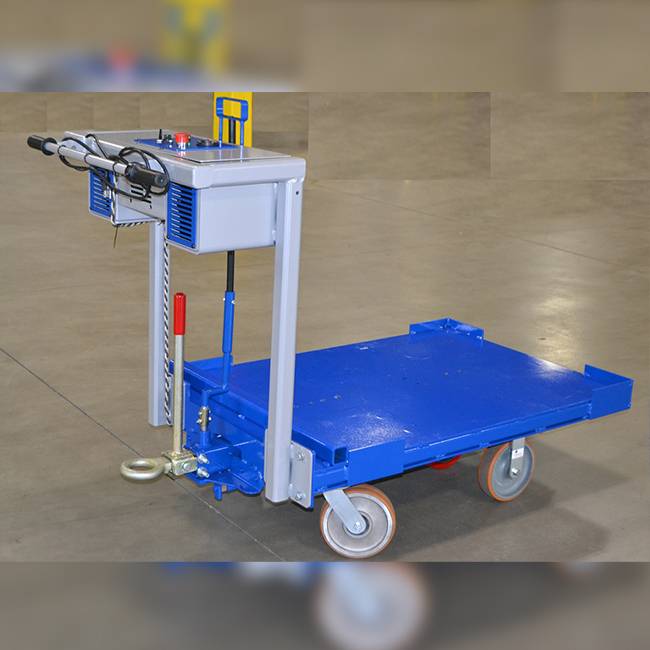
How Specialty Material Handling Carts Improve ROI.

In industrial domains, material handling efficiency is a critical factor. It ensures operational fluidity and underscores safety and productivity. The ability of specialty material handling carts to improve ROI is a significant leap in this sector.
Custom industrial carts are not mere tools; they are tailored solutions. Engineered to tackle specific challenges, motorized carts redefine the dynamics of load management. Their role extends beyond transportation, offering a refined approach to handling complex, heavy loads with precision and ease.
The Challenges of Material Handling in Industry.

· Risk of Injury in Material Operations
Material handling often involves risks that can lead to serious injuries. The manual handling of heavy loads poses a significant threat to workers, making safety protocols and efficient equipment essential in industrial settings.
· The Challenge of Extreme Loads
Every industry encounters unique loads that demand distinctive handling solutions. Standard equipment often fails to address these issues’ unique shape, size, or fragility, leading to operational inefficiencies.
· The Hidden Costs of Generic Solutions:
General-purpose material handling solutions often lead to increased worker headcount and a higher risk of damage. These issues not only slow down operations but also escalate hidden costs, impacting the overall financial health of a company. Adopting specialized handling equipment can mitigate these challenges and enhance operational efficiency.
Custom Industrial Carts: Tailored Solutions for Complex Needs.

Custom industrial carts are equipped with value-added features such as hydraulic lifts and versatile transfer systems to manage unique and challenging loads adeptly. This deliberate attention to design and functionality significantly enhances workflow efficiency, positioning each cart as a tool and a strategic investment. This aligns seamlessly with modern industries’ complex and evolving demands, where precision, adaptability, and efficiency are essential.
Related: Electric Material Handling Carts: Solving the Challenges for Commercial and Military Applications.
The Financial Implications of Custom Industrial Carts
· Initial Investment vs. Long-term Gains:
Despite their substantial initial investment, custom industrial carts deliver a strong ROI through their extensive long-term benefits. These reliable solutions boost operational efficiency, streamline workflows, and significantly reduce the risk of load damage.
Motorized material handling carts curtail labor costs by minimizing the need for manual intervention and frequent maintenance. Using specialized material handling carts to enhance operational efficacy ensures a safer working environment and drives a robust return on investment, making them a prudent choice for future-focused industrial operations.
· Comparing Custom and Standard Solutions
Custom carts excel in performance and adaptability compared to conventional options, offering a strategic solution for diverse and complex material handling needs. Standard carts can seem initially cost-effective but often fail to meet these specific demands, leading to unforeseen expenses and operational delays.
ROI Analysis: Cost-Benefit of Specialty Material Handling Carts

Material handling carts powered by drive casters offer significant benefits that can improve companies’ ROI. Integrating electric motors with industrial casters, as seen in the DRIVE CASTER®, substantially reduces the force required to move heavy carts, enhancing workplace productivity and safety. These motorized casters can move up to 10,000 pounds with the touch of a button. They can be retrofitted to existing carts, offering a cost-effective solution to improving material handling efficiency.
Let’s compare two hypothetical facilities.
Facility A: Using Manual Labor, Forklifts, and Cranes
- Labor Cost: High, due to the need for multiple certified operators for forklifts and cranes that are typically at a higher pay rate than manual laborers. The risk of injuries and associated costs are higher due to the interaction of forklifts and manual handling.
- Maintenance Cost: Significant, as forklifts and cranes require regular maintenance, repairs, and safety checks.
- Fuel Cost: Considerable, especially for gas or diesel-powered forklifts.
Facility B: Using Caster Drive Industrial Carts
- Labor Cost: Lower, as fewer operators are needed. Caster drive carts reduce the physical strain on workers, potentially reducing injuries and associated costs.
- Maintenance Cost: Generally lower than forklifts and cranes, electric-powered carts tend to have fewer mechanical components and require less maintenance.
- Fuel Cost: Lower, as electric-powered carts are more energy-efficient than gas or diesel forklifts. The cost is limited to electricity for charging batteries.
Comparative Analysis:
- Efficiency: Caster drive carts can be more efficient in transporting materials, especially in tight spaces, compared to forklifts and cranes.
- Safety: Reduced risk of injury with caster drive carts due to the cargo remaining on the ground, requiring less manual handling and simpler operation.
- Flexibility: Forklifts and cranes can handle a broader range of tasks and heavier loads, but caster drive carts are more maneuverable.
- Initial Investment: Forklifts and cranes have a higher initial investment than drive caster carts. Additionally, the investment of drive caster carts can be recouped quicker due to lower operating costs.
While forklifts and cranes are essential for specific heavy-duty tasks and offer versatility, caster-drive industrial carts provide a cost-effective and efficient solution for material handling, especially in facilities where maneuverability and space constraints are significant considerations. The selection and appropriate use of the two should be based on the facility’s specific needs, the nature of the materials handled, and the overall operational strategy.
Related: The Priceless Advantage of a Custom Solution
Conceptual Innovations: Engineering the Future of Material Handling.
Conceptual Innovations redefines material handling solutions, crafting drive carts that streamline and significantly enhance industrial operations. With a keen focus on integrating multifunctional features, the company adeptly tackles a wide array of material handling challenges, ensuring versatility and adaptability in every solution.
Our steadfast dedication to innovation, coupled with an unwavering commitment to safety and efficiency, guarantees that our products not only meet the immediate demands of the industry but also set new standards, paving the way for future technological advancements and operational excellence.
Interested in elevating your material handling operations? Contact us today and let our experts address your custom needs.
